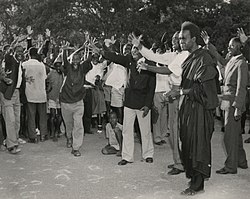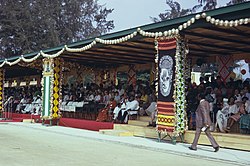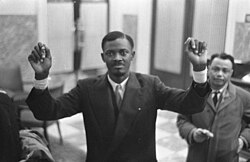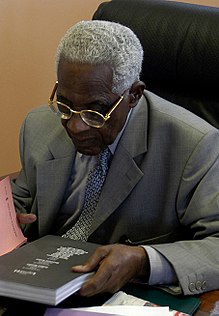IntroductionWelcome to the Pan-Africanism portal!
Bienvenue sur le portail panafricanisme!   Pan-Africanism is a worldwide movement that aims to encourage and strengthen bonds of solidarity between all indigenous peoples and diasporas of African ancestry. Based on a common goal dating back to the Atlantic slave trade, the movement extends beyond continental Africans with a substantial support base among the African diaspora in the Americas and Europe. Pan-Africanism can be said to have its origins in the struggles of the African people against enslavement and colonization and this struggle may be traced back to the first resistance on slave ships—rebellions and suicides—through the constant plantation and colonial uprisings and the "Back to Africa" movements of the 19th century. Based on the belief that unity is vital to economic, social, and political progress, it aims to "unify and uplift" people of African ancestry. ( Full article...) Selected article African nationalism is an umbrella term which refers to a group of political ideologies, mainly within Sub-Saharan Africa, which are based on the idea of national self-determination and the creation of nation states. Selected biography
Aimé Fernand David Césaire ( /seɪˈzɜːr/; French: [sezɛʁ]; 26 June 1913 – 17 April 2008) was a Francophone and French poet, author and politician from Martinique. He was "one of the founders of the négritude movement in Francophone literature". His works included Une Tempête, a response to Shakespeare's play The Tempest, and Discours sur le colonialisme (Discourse on Colonialism), an essay describing the strife between the colonizers and the colonized. His works have been translated into many languages. Selected history The First Pan-African Conference was held in London from 23 to 25 July 1900 (just prior to the Paris Exhibition of 1900 "in order to allow tourists of African descent to attend both events"). Organized primarily by the Trinidadian barrister Henry Sylvester Williams, it took place in Westminster Town Hall (now Caxton Hall) and was attended by 37 delegates and about 10 other participants and observers from Africa, the West Indies, the US and the UK, including Samuel Coleridge Taylor (the youngest delegate), John Alcindor, Dadabhai Naoroji, John Archer, Henry Francis Downing, and W. E. B. Du Bois, with Bishop Alexander Walters of the AME Zion Church taking the chair. Du Bois played a leading role, drafting a letter ("Address to the Nations of the World") to European leaders appealing to them to struggle against racism, to grant colonies in Africa and the West Indies the right to self-government and demanding political and other rights for African Americans. Selected culture
Haitian Vodou ( /ˈvoʊduː/, French: [vodu], also written as Vaudou /ˈvoʊduː/; known commonly as Voodoo /ˈvuːduː/, sometimes as Vodun /ˈvoʊduː/, Vodoun /ˈvoʊduːn/, Vodu /ˈvoʊduː/, or Vaudoux /ˈvoʊduː/) is a syncretic religion practiced chiefly in Haiti and the Haitian diaspora. Practitioners are called "vodouists" ( French: vodouisants [voduizɑ̃]) or "servants of the spirits" ( Haitian Creole: sèvitè). Vodouists believe in a distant and unknowable Supreme Creator, Bondye (derived from the French term Bon Dieu, meaning "good God"). According to Vodouists, Bondye does not intercede in human affairs, and thus they direct their worship toward spirits subservient to Bondye, called loa. Every loa is responsible for a particular aspect of life, with the dynamic and changing personalities of each loa reflecting the many possibilities inherent to the aspects of life over which they preside. To navigate daily life, vodouists cultivate personal relationships with the loa through the presentation of offerings, the creation of personal altars and devotional objects, and participation in elaborate ceremonies of music, dance, and spirit possession. Vodou originated in what is now Benin Republic and developed in the French colonial empire in the 18th century among West African peoples who were enslaved, when African religious practice was actively suppressed, and enslaved Africans were forced to convert to Christianity. Religious practices of contemporary Vodou are descended from, and closely related to, West African Vodun as practiced by the Fon and Ewe. Vodou also incorporates elements and symbolism from other African peoples including the Yoruba and Kongo; as well as Taíno religious beliefs, Roman Catholicism, and European spirituality including mysticism and other influences. Selected imagesOrganisations
All-African People's Revolutionary Party ·
African Society for Cultural Relations with Independent Africa ·
African Unification Front ·
African Union ·
African Queens and Women Cultural Leaders Network ·
Conseil de l'Entente ·
Convention People's Party ·
East African Community ·
Economic Freedom Fighters ·
Global Afrikan Congress ·
International African Service Bureau ·
International League for Darker People ·
Organisation of African Unity ·
Pan African Association ·
Pan-African Congress ·
Pan Africanist Congress of Azania ·
Rassemblement Démocratique Africain ·
Pan Africa Chemistry Network ·
Pan African Federation of Accountants ·
Pan-African Freedom Movement for East and Central Africa ·
Sahara and Sahel Observatory ·
UNIA-ACL ·
ZANU–PF
See also
& Festivals Photo by Helinä Rautavaara (1977) Publications
Films and TVAudios and videosDid you know ...that during the tumultuous
Year of Africa, seventeen countries
gained independence, South Africans began armed resistance to
apartheid, and
Patrice Lumumba (pictured) gained and lost his freedom?
Selected quotesIn addressing the first ever conference of the
Organization of African Unity (1st May 1963).
The Gambian Pan-Africanist and nationalist
Alieu Ebrima Cham Joof delivered the following message:
Pan-Africanism topicsCategoriesThings you can do
Related portalsAssociated WikimediaThe following Wikimedia Foundation sister projects provide more on this subject:
Discover Wikipedia using
portals | ||||||||||||||||||||||||||||||||||































